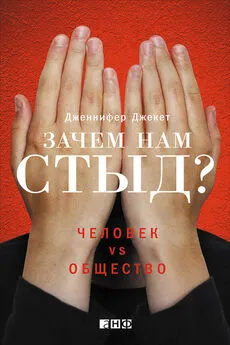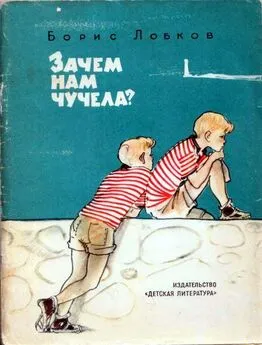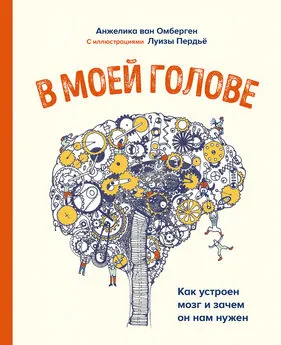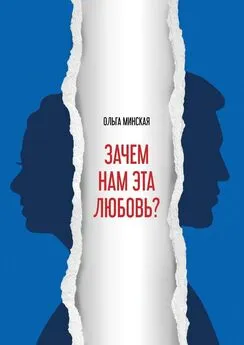Дженнифер Джекет - Зачем нам стыд? Человек vs. общество
- Название:Зачем нам стыд? Человек vs. общество
- Автор:
- Жанр:
- Издательство:Литагент Альпина
- Год:2016
- Город:Москва
- ISBN:978-5-9614-4248-9
- Рейтинг:
- Избранное:Добавить в избранное
-
Отзывы:
-
Ваша оценка:
Дженнифер Джекет - Зачем нам стыд? Человек vs. общество краткое содержание
Зачем нам стыд? Человек vs. общество - читать онлайн бесплатно ознакомительный отрывок
Интервал:
Закладка:
Сноски
1
Бенедикт Р. Хризантема и меч. Модели японской культуры. – М.: Наука, 2007.
2
Фуко М. Надзирать и наказывать. Рождение тюрьмы. – М.: Ad Marginem, 1999.
3
Межправительственная комиссия по проблемам климатических изменений. – Прим. ред.
4
В переводе с английского «священные продукты». – Прим. ред.
5
План «сокращения зарплаты» – сберегательный план, позволяющий работнику фирмы вносить часть зарплаты до налогообложения в инвестиционный пул под управлением работодателя. – Прим. пер.
6
Речь идет о данных, что 1 % богатейших жителей США контролируют львиную долю богатства страны, тогда как участники акции воплощают интересы и пользуются поддержкой «остальных 99 %» – что, впрочем, не соответствовало действительности. – Прим. пер.
7
Ланир Дж. Вы не гаджет. Манифест. – М.: Астрель, Corpus, 2011.
8
Сокал А., Брикмон Ж. Интеллектуальные уловки. Критика современной философии постмодерна. – М.: Дом интеллектуальной книги, 2002.
Комментарии
1
Carl D. Schneider, Shame, Exposure, and Privacy (New York: Norton, 1992).
2
Mary M. Herrald and Joe Tomaka, «Patterns of Emotion-Specific Appraisal, Coping, and Cardiovascular Reactivity During an Ongoing Emotional Episode,» Journal of Personality and Social Psychology 83, no. 2 (2002): 434–450.
3
Christine R. Harris and Ryan S. Darby, «Shame in Physical-Patient Interactions: Patient Perspectives,» Basic and Applied Social Psychology 31, no. 4 (2009): 325–334.
4
Stephen Bates, «Jonathan Franzen: Shame Made It Impossible for Me to Write for a Decade,» The Guardian, October 29, 2010.
5
Virginia Morell, Animal Wise: The Thoughts and Emotions of Our Fellow Creatures (New York: Crown, 2013).
6
Polly Wiessner, «Norm Enforcement Among the Ju/'Hoansi Bushmen,» Human Nature 16, no. 2 (2005): 115–145.
7
Robin Dunbar, «Co-Evolution of Neocortical Size, Group Size and Language in Humans,» Behavioral and Brain Sciences 16, no. 4 (1993): 681–735.
8
Jennifer Jacquet, Christoph Hauert, Arne Traulsen, and Manfred Milinski: «Shame and Honour Drive Cooperation,» Biology Letters 7 (2011): 899–901.
9
June Price Tangney and Ronda L. Dearing, Shame and Guilt (New York: Guilford Press, 2002), 58.
10
Daniel M. T. Fessler, «Shame in Two Cultures: Implications for Evolutionary Approaches,» Journal of Cognition and Culture 4, No. 2 (2004): 207–262.
11
Marvin Spevack, A Complete and Systematic Concordance to the Works of Shakespeare (Hildesheim, Germany: Georg Olms, 1968).
12
Roy F. Baumeister, Harry T. Reis, and Philippe Delespaul, «Subjective and Experiential Correlates of Guilt in Daily Life,» Personality and Social Psychology Bulletin 21, no. 12 (1995): 1256–1268.
13
Herant Katchadourian, Guilt: The Bite of Conscience (Stanford, Calif.: Stanford General Books, 2011).
14
Robert L. Trivers, «The Evolution of Reciprocal Altruism,» Quarterly Review of Biology 46, no. 1 (1971): 35–57.
15
Toni M. Massaro, «Shame, Culture, and American Criminal Law,» Michigan Law Review 89, no. 7 (1991): 1880–1944.
16
Martha Nussbaum, Hiding from Humanity: Disgust, Shame, and the Law (Princeton, N. J.: Princeton University Press, 2006).
17
James Q. Whitman, «What Is Wrong with Inflicting Shame Sanctions?» Yale Law Journal 107, no. 5 (1998): 1055–1092.
18
Adam Duhachek, Shuoyang Zhang, and H. Shanker Krishnan, «Anticipated Group Interaction: Coping with Valence Asymmetries in Attitude Shift,» Journal of Consumer Research 34, no. 3 (2007): 395–405.
19
Daniel Kahneman and Amos Tversky, «Choices, Values, and Frames,» American Psychologist 39, no. 4 (1984): 341–350.
20
Tara L. Gruenewald, Margaret E. Kemeny, Najib Aziz, and John L. Fahey, «Acute Threat to the Social Self: Shame, Social Self-Esteem, and Cortisol Activity,» Psychosomatic Medicine 66, no. 6 (2004): 915–924.
21
Michael Lewis, «Self-Conscious Emotions: Embarrassment, Pride, Shame, and Guilt,» in Handbook of Emotions, ed. Michael Lewis and Jeannette M. Haviland-Jones (New York: Guilford, 1993), 353–364.
22
Jonathan Haidt and Dacher Keltner, «Culture and Facial Expression: Open-Ended Methods Find More Expressions and a Gradient of Recognition,» Cognition and Emotion 13, no. 3 (1999): 225–266.
23
Peter De Jong, Madelon L. Peters, and David De Cremer, «Blushing May Signify Guilt: Revealing Effects of Blushing in Ambiguous Social Situations,» Motivation and Emotion 27, no. 3 (2003): 225–249.
24
Charles Darwin, The Expressions of Emotions in Man and Animals (London: John Murray, 1872).
25
Jessica L. Tracy and David Matsumoto, «The Spontaneous Expression of Pride and Shame: Evidence for Biologically Innate Nonverbal Displays,» Proceedings of the National Academy of Sciences 105, no. 33 (2008): 11655–11660.
26
Dacher Keltner, Randall C. Young, and Brenda N. Buswell, «Appeasement in Human Emotion, Social Practice, and Personality,» Aggressive Behavior 23, no. 5 (1997): 359–374.
27
Dacher Keltner and Brenda N. Buswell, «Evidence for the Distinctness of Embarrassment, Shame, and Guilt: A Study of Recalled Antecedents and Facial Expressions of Emotion,» Cognition and Emotion 10, no. 2 (1996): 155–171.
28
Michael Lewis and Douglas Ramsay, «Cortisol Response to Embarrassment and Shame,» Child Development 73, no. 4 (2002): 1034–1045.
29
Stanley T. Asah and Dale J. Biahna, «Motivational Functionalism and Urban Conservation Stewardship: Implications for Volunteer Involvement,» Conservation Letters 5, no. 6 (2012): 470–477.
30
Alan S. Gerber, Donald P. Green, and Christopher W. Larimer, «An Experiment Testing the Relative Effectiveness of Encouraging Voter Participation by Inducing Feelings of Pride or Shame,» Political Behavior 32, no. 3 (2010): 409–422.
31
Marion Long, «George Schaller's Grand Plan to Save the Marco Polo Sheep,» Discover, March 2008.
32
Peter Schweizer, «Offset Away Our Guilt,» USA Today, April 7, 2011.
33
Michael P. Vandenbergh, Thomas Dietz, and Paul C. Stern, «Time to Try Carbon Labelling,» Nature Climate Change 1, no. 1 (2011): 4–6.
34
Stephanie Strom, «Has 'Organic' Been Oversized?» New York Times, July 7, 2012.
35
Nicole Charky, «Wal-Mart Removes Mislabeled Organic Products from Shelves,» Daily Finance, April 23, 2010.
36
Keith Bradsher, «Chinese City Shuts Down 13 Wal-Marts,» New York Times, October 10, 2011, www.nytimes.com/2011/10/11/business/global/wal-marts-in-china-city-closed-for-pork-mislabeling. html.
37
Nina Mazar and Chen-Bo Zhong, «Do Green Products Make Us Better People?» Psychological Science 21, no. 4 (2010): 494–498.
38
Kirk Kristofferson, Katherine White, and John Peloza, «The Nature of Slacktivism: How the Social Observability of an Initial Act of Token Support Affects Subsequent Prosocial Action,» Journal of Consumer Research 40, no. 6 (2014): 1149–1166.
39
David Sutton, «An Unsatisfactory Encounter with the MSC – A Conservation Perspective,» in Eco-Labelling in Fisheries: What Is It All About? ed. Bruce Phillips, Trevor Ward, and Chet Chaffee (Oxford, UK: Blackwell Publishing, 2003), 114–119.
40
Shahzeen Z. Attari, Michael L. Dekay, Cliff I. Davidson, and Wändi Bruine De Bruin, «Public Perceptions of Energy Consumption and Savings,» Proceedings of the National Academy of Sciences 107, no. 37 (2010): 16054–16059.
41
Peter Whoriskey, "SUVs Lead U. S. Auto Sales Growth Despite Efforts to Improve Fuel Efficiency, Washington Post, December 29, 2010.
42
Robert Paine, «A Note on Trophic Complexity and Community Stability,» The American Naturalist 103, no. 929 (1969): 91–93.
43
Эта фраза принадлежит ученому Льюису Ричардсону, опубликовавшему в 1969 году книгу с таким названием.
44
Anthony D. Barnosky, Nicholas Matzke, Susumu Tomiya, et al., «Has the Earth's Sixth Mass Extinction Already Arrived?» Nature 471, no. 7336 (2011): 51–57.
45
Richard Heede, «Tracing Anthropogenic Carbon Dioxide and Methane Emissions to Fossil Fuel and Current Producers, 1854–2010,» Climate Change 122 (2014): 229–241.
46
Naomi Oreskes and Erik M. Conway, Merchants of Doubt: How a Handful of Scientists Obscured the Truth on Issues from Tobacco Smoke to Global Warming (New York: Bloomsbury, 2010), 213.
47
David Berreby, Us and Them: Understanding Your Tribal Mind (New York: Little, Brown, 2005), 161.
48
Atul Gawande, «The Hot Spotters,» The New Yorker, January 24, 2011.
49
Jonathan Franzen, «Emptying the Skies,» The New Yorker, July 26, 2010.
50
Pierline Tournant, Liana Joseph, Koichi Goka, and Franck Courchamp, «The Rarity and Overexploitation Paradox: Stag Beetle Collections in Japan,» Biodiversity and Conservation 21, no. 6 (2012): 1425–1440.
Читать дальшеИнтервал:
Закладка:










